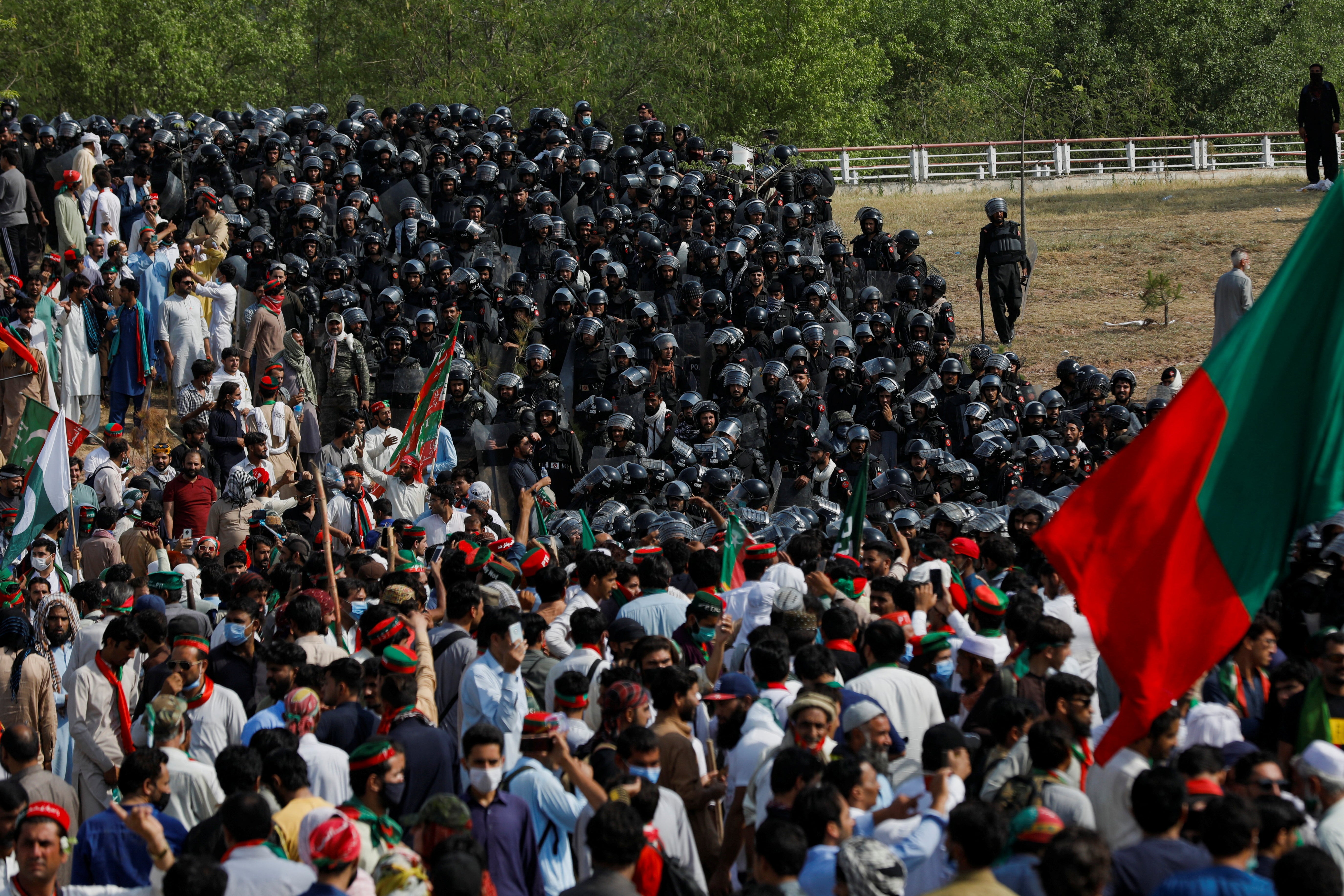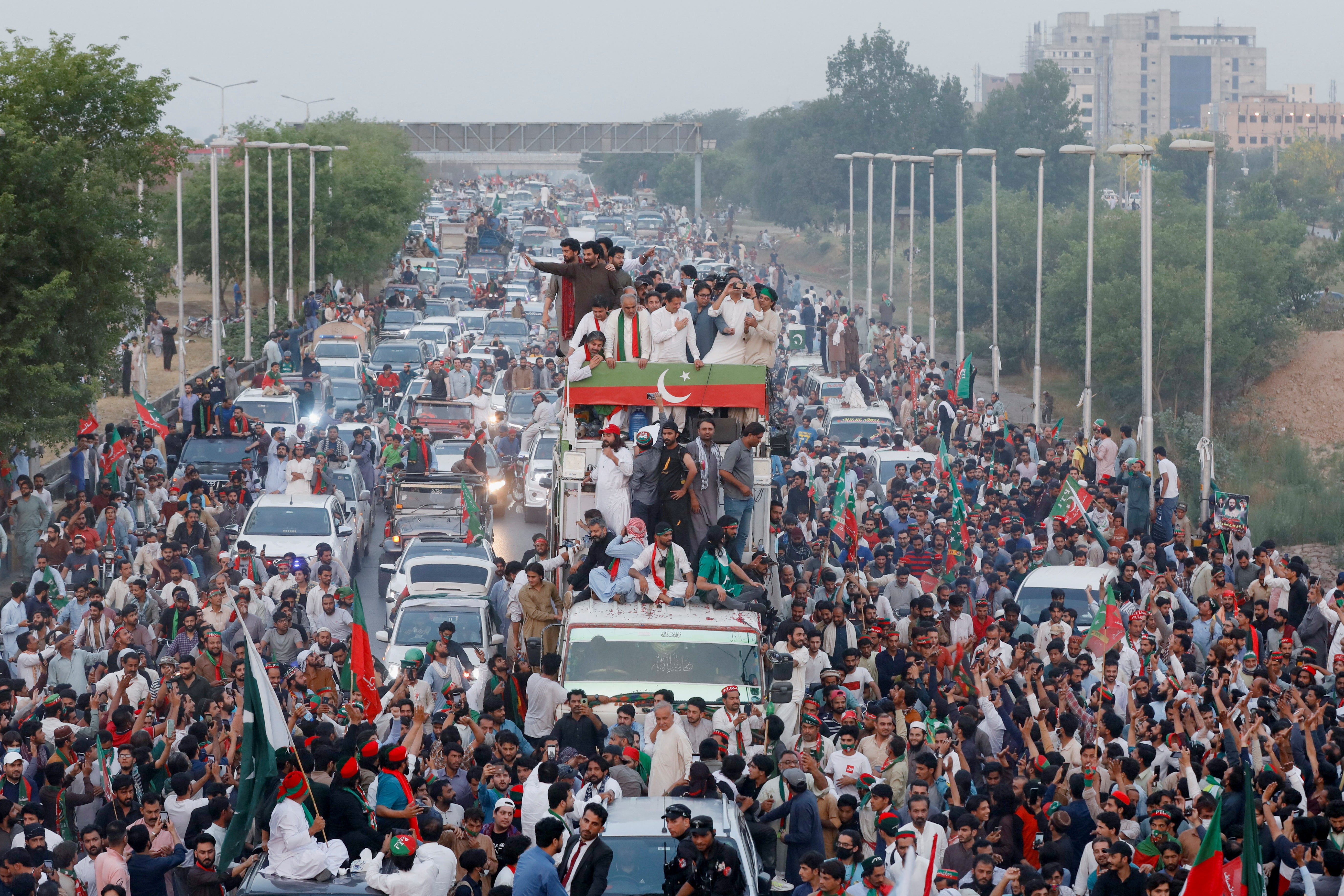Imran Khan calls off Islamabad sit-in as he issues Pakistan government with deadline
Khan’s attempt to destabilise government comes as Pakistan is on verge of descending into economic crisis
Your support helps us to tell the story
From reproductive rights to climate change to Big Tech, The Independent is on the ground when the story is developing. Whether it's investigating the financials of Elon Musk's pro-Trump PAC or producing our latest documentary, 'The A Word', which shines a light on the American women fighting for reproductive rights, we know how important it is to parse out the facts from the messaging.
At such a critical moment in US history, we need reporters on the ground. Your donation allows us to keep sending journalists to speak to both sides of the story.
The Independent is trusted by Americans across the entire political spectrum. And unlike many other quality news outlets, we choose not to lock Americans out of our reporting and analysis with paywalls. We believe quality journalism should be available to everyone, paid for by those who can afford it.
Your support makes all the difference.Pakistan’s ousted prime minister Imran Khan called off a planned protest march in Islamabad on Thursday, a day after major cities became battlegrounds as his supporters clashed with police.
Mr Khan instead demanded that parliament should be dissolved to hold snap elections in June, and threatened to return to the capital with 3 million supporters otherwise.
“I’m giving you six days. You announce elections in six days. If you don’t do it after six days, I will return,” Mr Khan said from atop a sound truck in the capital.
In response, Prime Minister Shahbaz Sharif, who replaced Mr Khan in April, said the parliament will not be dictated by his predecessor.
“I want to clarify to leader of this group [the Pakistan Tehreek-e-Insaf], your dictation won’t work. This house will decide when to hold elections,” Mr Sharif said.
Mr Khan’s attempt to destabilise Mr Sharif’s month-old coalition government comes as Pakistan is on the verge of descending into an economic crisis, forcing the country to seek urgent help from the International Monetary Fund.
The government on Thursday convened a joint session of parliament to address the issue following talks with IMF officials in Doha on Wednesday. The IMF had urged Islamabad to remove fuel and energy subsidies to overcome the looming crisis.

There was no petrol available in petrol stations in the city of Lahore and ATM machines were out of cash, former Pakistani cricketer Mohammad Hafeez said in a tweet, giving a glimpse of ongoing issues in the country.
“No petrol available in any petrol station in Lahore??? No cash available in ATM machines?? Why a common man have to suffer from political decisions? [sic]” Mr Hafeez, who has a reputation for being outspoken, said in a tweet tagging both Mr Khan and Mr Sharif.
Pakistan is battling the second-fastest inflation in Asia and facing a looming economic crisis akin to that of Sri Lanka, with its foreign reserves drying up. Those that remain are only enough to cover less than two months’ worth of imports after a barrage of financial shocks including the pandemic, the war in Ukraine and rising interest rates.
These are part of the reasons for the unpopularity of Mr Khan’s administration in its final months, and the circumstances that gave an opportunity to his rivals to hold a historic vote of no confidence in April.
While no Pakistani leader has seen out a full term in office, the former international cricketer is the country’s first prime minister to be removed through a no-confidence vote.

But since his ouster, Mr Khan has successfully rallied his support on the ground, finding sympathy with claims that his removal from office was the result of a US-led conspiracy because his foreign policy leaned towards China and Russia.
Washington has denied the allegation, and Mr Sharif has called Mr Khan’s claim “a pack of lies”.
On Wednesday, he temporarily raised fears of a protracted civil conflict after ordering his supporters across Pakistan to descend on Islamabad in a “Long March”, also referred to as an “Azadi” or freedom march, and there were clashes with police.
His supporters defied restrictions by local governments aimed at blocking their protests, using excavators and other equipment to remove shipping containers, barricades, and other impediments deployed by the police to block roads leading to major cities.
The clashes forced riot police to fire tear gas and push back hundreds of pro-Khan demonstrators, who hurled stones as they tried to pass a roadblocked bridge near the city to board buses bound for Islamabad.
The government said it has arrested more than 1,700 supporters of Mr Khan in the past 48 hours.
The ruling coalition government of PML-N and the Pakistan People’s Party (PPP), which wrested power from Mr Khan, had refused to provide permission for the march on Tuesday after they said the Pakistan Tehreek-e-Insaf failed to assure them of peaceful demonstrations. The country’s Supreme Court did not back the march itself, but said PTI should be allowed space to hold a peaceful political rally in Islamabad and that its leaders should not be targeted unduly by the authorities.
Additional reporting by agencies

Join our commenting forum
Join thought-provoking conversations, follow other Independent readers and see their replies
Comments